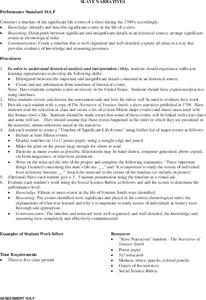Reading Through History
The Emancipation Proclamation
The Emancipation Proclamation: one of the most important primary sources for studying American history! An interdisciplinary resource includes a reading of Abraham Lincoln's seminal speech quoted directly. Following the reading, pupils...
DocsTeach
Oh Freedom! Sought Under the Fugitive Slave Act
Using the harrowing story of the Crafts, a couple enslaved in the South who escaped to freedom, young historians trace the story of the Fugitive Slave Act. After examining documents, including affidavits and arrest warrants for the...
Digital Public Library of America
Fannie Lou Hamer and the Civil Rights Movement in Rural Mississippi
Good primary resources, offering different perspectives on important issues and events, are hard to find. A packet of 12 primary source images, videos, audio recordings, records, and newspaper articles related to the 1960s civil rights...
Digital Public Library of America
The Underground Railroad and the Fugitive Slave Act of 1850
Escaping Enslaved people attempting to escape didn't need a ticket to ride on the Underground Railroad. Here is a packet of primary sources that reveal the kind of courage and determination they did need to face the challenges to gain...
Digital Public Library of America
The Adventures of Huckleberry Finn by Mark Twain
Mark Twain's The Adventures of Huckleberry Finn is the focus of a teaching guide that introduces readers to some of the many controversies surrounding the use of the novel in classrooms. The packet includes 15 primary source excerpts and...
C3 Teachers
Emancipation: Does It Matter Who Freed the Slaves?
Scholars generally agree on the emancipation of enslaved people in the United States. This inquiry-based lesson asks high schoolers to consider more than the claims of who freed the enslaved people but the significance of the issues...
C3 Teachers
Reparations: Why Are Reparations Controversial?
To understand why the topic of reparations is controversial, young scholars gather background information by reading articles, watching videos, and examining cases where reparations were made. Learners consider the lasting repercussions...
C3 Teachers
African Americans and the Civil War: How Did African Americans Experience the Civil War?
To understand African Americans' involvement in the United States Civil War, high schoolers gather evidence from primary source images, census reports, and documents. As a summative performance task, individuals craft an argument,...
Curated OER
Forest Joe Lesson Plan: Outlaw or Hero?
Pupils become familiar with an American legend that is unfamiliar to many. Presented with the legend of Forest Joe, a runaway slave who, much like Robin Hood, stole from the rich to give to the poor, students draw comparisons and...
Curated OER
Abraham Lincoln on the American Union: " A Word Fitly Spoken"
Students consider Lincoln's perspective. In this presidential perspectives lesson, students explore the political thoughts of Lincoln through a series of lessons that make use of primary source analysis. They hypothesize and take a...
Curated OER
Indentured Servitude of Native Americans in Southern New England
Learners explore slavery by researching Native American history. In this racial prejudice lesson, students identify the treatment of Native Americans in the New England area 200 years ago. Learners answer study questions based on the...
Curated OER
Underground Travelers
Students are introduced to new vocabulary associated with the Underground Railroad. Using primary sources, they evaluate the railroad's impact on society in the past and today. They also make a judgment about the morality of the railroad...
Curated OER
Enslaved and Running
Students use runaway slave advertisements to discover how the language varies from the 18th to 21st century. Using primary source documents, they research the brutality of slavery and the desire of those in slavery to be free. They...
Curated OER
Southern Agriculture and the Slave Trade
Students examine the relationship between agriculture and the slave trade during the 1860s. In groups, they research how two factors led to the explosion of slavery in the Southern United States. Using maps, they answer comprehension...
Curated OER
Tobacco: Field Laborers
Eighth graders examine a picture of a tobacco laborer. Using that information, they write a story describing a typical work day for them. They evaluate the impact of political and technological changes in the area as well as the role...
Curated OER
Political and Social Origins of the Civil War
Students examine the difference in politics in the North and South during the Civil War. Using that information, they discuss how politics and ideologies led to the war. They explain the causes and effects of the war and evaluate the...
Curated OER
The Abolitionist Movement
Students examine the Abolitionist Movement in Delaware. In groups, they examine a petition presented to the general assembly and an anti-slavery broadside. They compare and contrast the two documents and develop their own broadside to...
Curated OER
The Patchwork Path
Fourth graders investigate slavery by reading a book with their classmates. In this abolitionist movement lesson, 4th graders read the story The Patchwork Path, and discuss the creation of the Underground Railroad. Students create...
Curated OER
Americans Who Stood Up for Their Beliefs
Students will reflect upon the use of music to teach lessons throughout history. The focus of the study is based upon early American History. The tie of music and the abolition of slavery makes for interesting inquiry for learners.
Curated OER
Prince Hall and His Organization of Black Free Masons in the United States
Students examine the life of Prince Hall who became a member of the Free Masons during the time period of slavery. Depending on the grade level, they are shown pictures or read a reference guide listing the characteristics of each...
Curated OER
How Africans Became Slaves for the Colonists
Students complete a t-chart identifying the advantages and disadvantages of having indentured servants. In groups, they research the use of serfs and slaves in various cultures and share their responses. To end the lesson, they...
Curated OER
Time Marches On
Students discover the times of Colonial America by creating a timeline. In this U.S. History activity, students research a teacher-directed website about African Americans in early colonial times. Students utilize their information to...
Curated OER
Declaration of Independence: Created Equal?
Students examine how Jefferson dealt with equality. In this activity on the Declaration of Independence, students use primary sources to analyze what the phrase, "All men are created equal" meant. They will compare what they think...
Curated OER
Slave Narratives
Students examine many different slave narratives living in the 1700s. In groups, they identify and describe the major events in their lives and arrange them into chronological order. They use this information to create a timeline and...
Other popular searches
- Up From Slavery
- Civil War Slavery
- Abraham Lincoln and Slavery
- Slavery Art
- Abolition of Slavery
- American Slavery
- Anti Slavery Poetry
- African American Slavery
- Slavery Issue
- Controversy Over Slavery
- Escaping From Slavery
- Constitution: Slavery

























